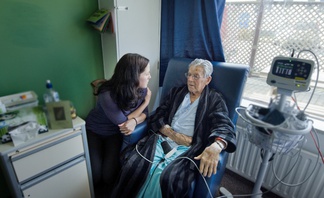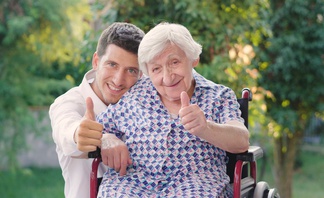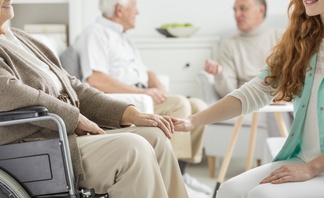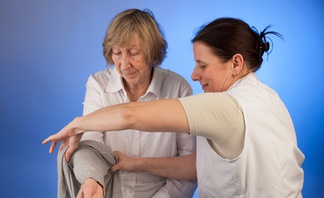People who are bed-bound, face challenges related to immobility. Personal hygiene, nutrition, muscle weakness, breathing problems and skin breakdown, are among the many considerations that caregivers face. The knowledge of simple steps, along with compassion and patience, can help prevent complications such as bed sores, from developing.
Here is a list of areas to be attentive to. We use a “top to bottom” method to make sure we don’t miss any areas.
-
Room Setting: It is easy to get disoriented while remaining bed-bound all day and without structured routine. Placing a clock and a calendar that is easily visible, can help the person maintain orientation to time and date. Decorating the room with pictures of loved ones or mementoes, flowers and pictures, can brighten a room. Sunlight and fresh air also help. Relaxing and soft instrumental music can be soothing and even relieve physical pain.
-
Bedding: To prevent bed sores from developing, there are a few pressure-release measures. A mattress overlay made of foam, gel or air-filled chambers can help distribute pressure evenly because constant pressure on bony prominences like the heels, shoulder blades, elbows and sacrum can cause skin breakdown. There are also booties made from soft material (like lambswool), that can be used to protect the heels.Change the person’s position every two hours to prevent constant pressure on bony prominences. Linens should be changed everyday. Changing linens is usually a two-person task that involves log-rolling the person to one side and then while one caregiver is holding the person in position, the other is rolling up the dirty sheet and replacing it with the new one. Then the process is repeated on the other side. You will need to recruit family members or hospice staff to assist.
-
General Hygiene: Assist the person with daily hygiene including a bed bath, oral care, hair care, shaving and applying makeup.
-
Mental & emotional health: Just because a person is physically and/or mentally incapacitated does not mean they deserve being treated in no less than any way we would respectfully treat any other Client. Remember our company’s 3C’s (Care, Compassion and Client-centeredness) core values and engage with our Clients as you would a beloved family member or in a manner that you would want to be if you were in their situation. Provide and promote activities for the bedridden person. Invite family and friends to visit them. Encourage them to watch television or listen to a radio for entertainment.
-
Skin: Keep the skin clean and dry. Apply moisturizer or a moisture-barrier cream.
-
Hair: There are specially designed basins and shampoos for the bed-bound person. Some of these shampoos can be used without water and rinsing. Check out this video: https://www.leaf.tv/articles/how-to-shampoo-a-bedridden-persons-hair/
-
Face: A gentle face wash 3-5 times a day can be very refreshing.
-
Eyes: Gently clean eyes with every face wash. Eyes may get dry and irritated from lowered fluid intake. In which case, lubricant saline or water eye drops can be used.
-
Ears: Encourage use of hearing aids (if the person has these) when awake since hearing will help them remain more connected with their family, caregivers and environment.
-
Mouth: Brush teeth and tongue in the morning, at bedtime and after meals. Since their maybe decreased food and fluid intake, the saliva may be thickened and form crusts that should be cleared. Oral cleanliness can significantly improve comfort.
-
Nose: if nasal passages seem dry, a humidifier in the room could help prevent congestion and even nose bleeds.
-
Breathing: Remind the person to perform coughing and deep-breathing exercises every two hours while awake to prevent secretions from pooling in the lungs. Have him take a deep breath and then cough three times.
-
Nutrition: position the hospital bed upright to prevent choking (aspiration) and offer regular calorie-dense meals and plenty of fluids. Keep fluids in reach and in a container with a straw. Encourage drinking at least every hour. Provide small, frequent meals and, if supported by the physician, a dietary supplement high in protein.
-
Arms and Legs: repositioning should be done frequently every 1-2 hours (do not go over 2 hours if the person is completely bed-bound).
-
Hands and Feet: Use positioning devices like footboards to prevent foot drop, and hand rolls between the palm and fingers to prevent or slow the progression of hand contractures.
-
Muscle Strength: perform active or passive range-of-motion exercises that can maintain function and flexibility. Active range-of-motion exercises are performed by the person while passive range-of-motion exercises are performed on the person by a caregiver. Massages help maintain muscle tone and provide significant relief.
-
Bowel and Bladder: assist the person to use the bathroom at least every three hours while awake. Clean the person after toileting and replace soiled disposable underwear or pads as soon as possible. A bedside commode makes toileting much easier for the frail and debilitated. Use a plastic bag to line the bucket so you can easily dispose of waste.





